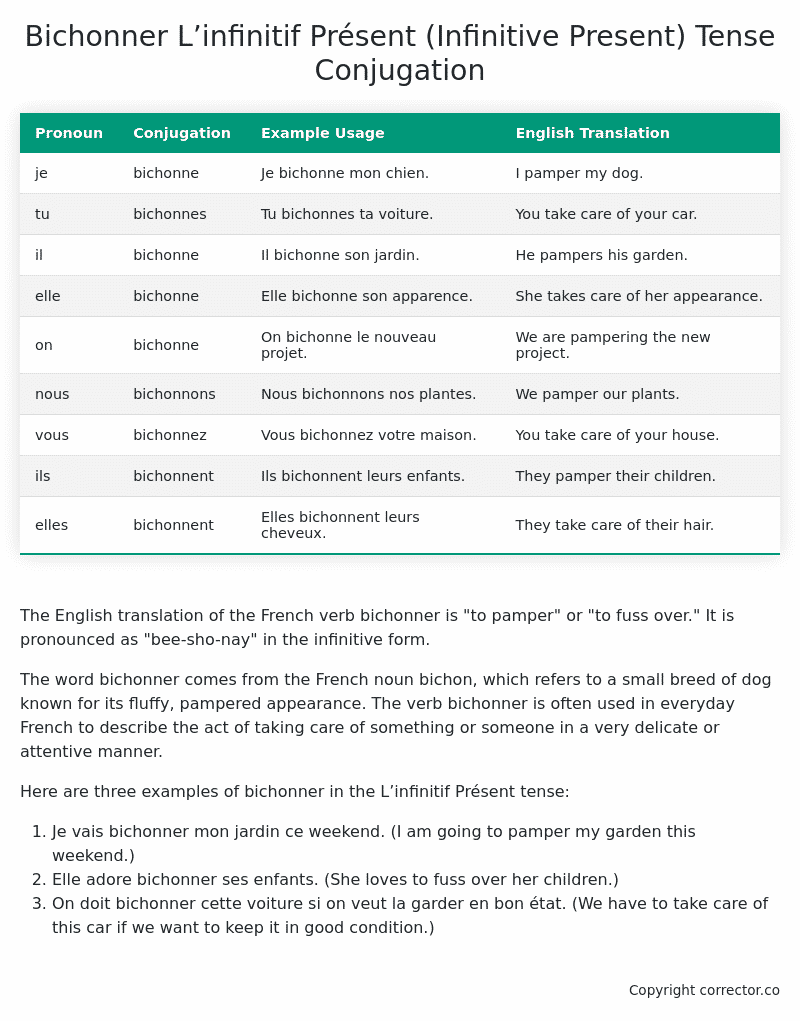L’infinitif Présent (Infinitive Present) Tense Conjugation of the French Verb bichonner
Introduction to the verb bichonner
The English translation of the French verb bichonner is “to pamper” or “to fuss over.” It is pronounced as “bee-sho-nay” in the infinitive form.
The word bichonner comes from the French noun bichon, which refers to a small breed of dog known for its fluffy, pampered appearance. The verb bichonner is often used in everyday French to describe the act of taking care of something or someone in a very delicate or attentive manner.
Here are three examples of bichonner in the L’infinitif Présent tense:
- Je vais bichonner mon jardin ce weekend. (I am going to pamper my garden this weekend.)
- Elle adore bichonner ses enfants. (She loves to fuss over her children.)
- On doit bichonner cette voiture si on veut la garder en bon état. (We have to take care of this car if we want to keep it in good condition.)
Table of the L’infinitif Présent (Infinitive Present) Tense Conjugation of bichonner
| Pronoun | Conjugation | Example Usage | English Translation |
|---|---|---|---|
| je | bichonne | Je bichonne mon chien. | I pamper my dog. |
| tu | bichonnes | Tu bichonnes ta voiture. | You take care of your car. |
| il | bichonne | Il bichonne son jardin. | He pampers his garden. |
| elle | bichonne | Elle bichonne son apparence. | She takes care of her appearance. |
| on | bichonne | On bichonne le nouveau projet. | We are pampering the new project. |
| nous | bichonnons | Nous bichonnons nos plantes. | We pamper our plants. |
| vous | bichonnez | Vous bichonnez votre maison. | You take care of your house. |
| ils | bichonnent | Ils bichonnent leurs enfants. | They pamper their children. |
| elles | bichonnent | Elles bichonnent leurs cheveux. | They take care of their hair. |
Other Conjugations for Bichonner.
Le Present (Present Tense) Conjugation of the French Verb bichonner
Imparfait (Imperfect) Tense Conjugation of the French Verb bichonner
Passé Simple (Simple Past) Tense Conjugation of the French Verb bichonner
Passé Composé (Present Perfect) Tense Conjugation of the French Verb bichonner
Futur Simple (Simple Future) Tense Conjugation of the French Verb bichonner
Futur Proche (Near Future) Tense Conjugation of the French Verb bichonner
Plus-que-parfait (Pluperfect) Tense Conjugation of the French Verb bichonner
Passé Antérieur (Past Anterior) Tense Conjugation of the French Verb bichonner
Futur Antérieur (Future Anterior) Tense Conjugation of the French Verb bichonner
Subjonctif Présent (Subjunctive Present) Tense Conjugation of the French Verb bichonner
Subjonctif Passé (Subjunctive Past) Tense Conjugation of the French Verb bichonner
Subjonctif Imparfait (Subjunctive Imperfect) Tense Conjugation of the French Verb bichonner
Subjonctif Plus-que-parfait (Subjunctive Pluperfect) Tense Conjugation of the French Verb bichonner
Conditionnel Présent (Conditional Present) Tense Conjugation of the French Verb bichonner
Conditionnel Passé (Conditional Past) Tense Conjugation of the French Verb bichonner
L’impératif Présent (Imperative Present) Tense Conjugation of the French Verb bichonner
L’infinitif Présent (Infinitive Present) Tense Conjugation of the French Verb bichonner (this article)
Struggling with French verbs or the language in general? Why not use our free French Grammar Checker – no registration required!
Get a FREE Download Study Sheet of this Conjugation 🔥
Simply right click the image below, click “save image” and get your free reference for the bichonner L’infinitif Présent tense conjugation!

Bichonner – About the French L’infinitif Présent (Infinitive Present) Tense
Forming the Infinitive Present
Common Everyday Usage Patterns
As a Verb’s Dictionary Form
After Modal Verbs
As an Imperative
In Infinitive Clauses
Interactions with Other Tenses
Present Tense
Future Tense
Conditional Tense
Passé Composé
Imperfect Tense
Subjunctive and Conditional Moods
Summary
Want More?
I hope you enjoyed this article on the verb bichonner. Still in a learning mood? Check out another TOTALLY random French verb conjugation!


